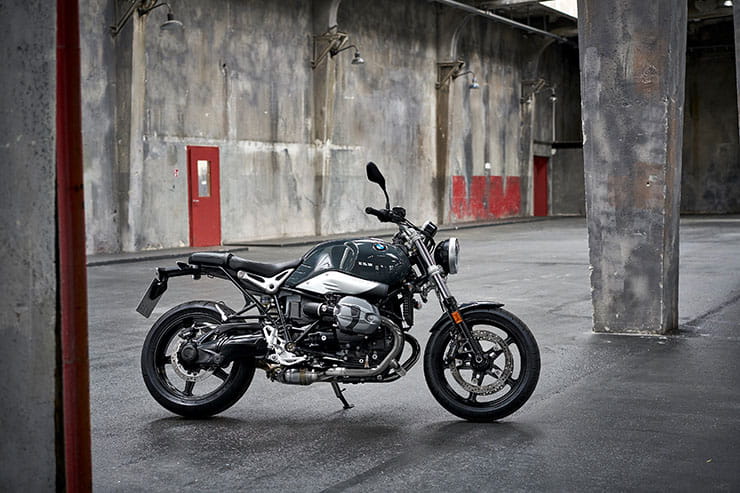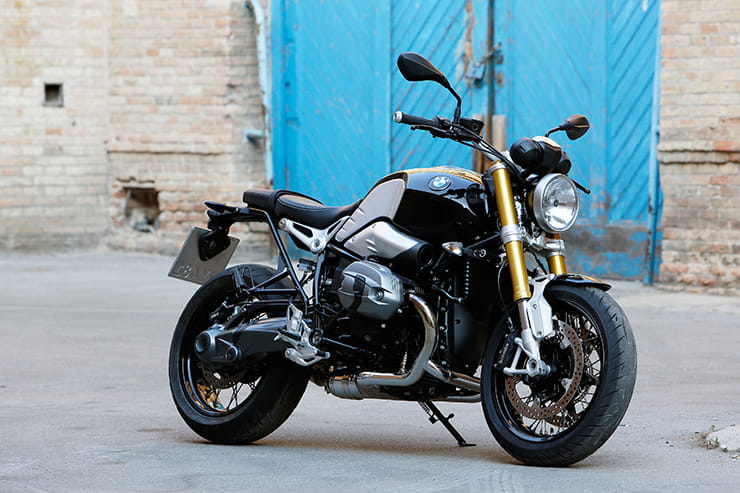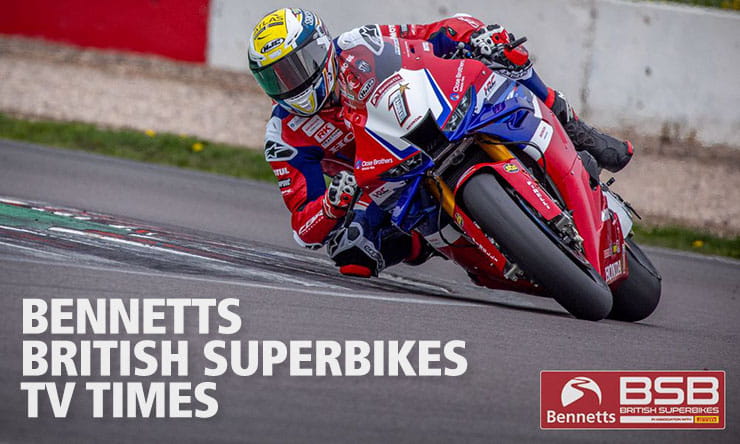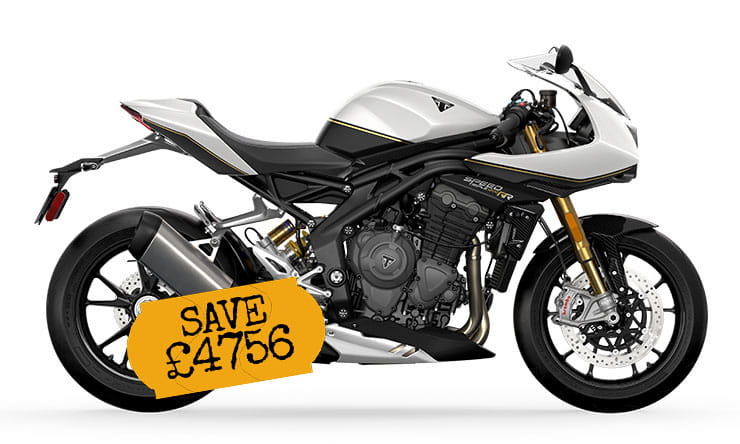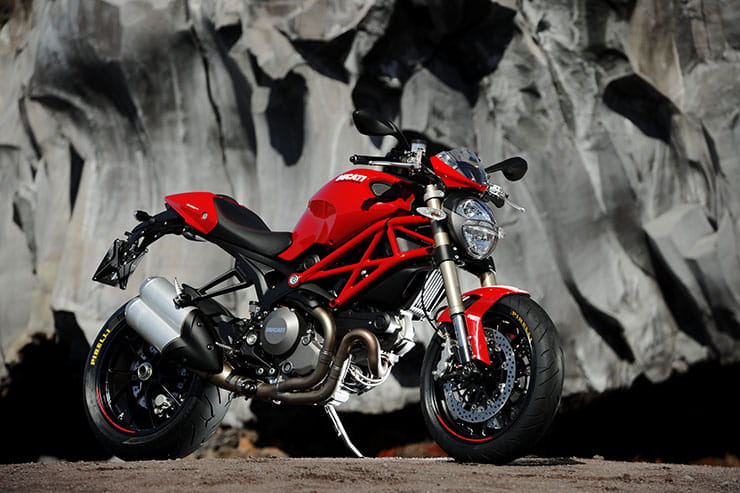
Price: £6000-£7500 | Power: 100bhp | Weight: 188kg | Overall BikeSocial Rating: 4/5
The Monster 1100 Evo is a bike that is easily over-looked. Arriving in 2012, it replaced both the Monster 1100 and Monster 1100S and was effectively a stop-gap model before the all-new liquid-cooled Monster 1200 arrived in 2014. Still powered by an air-cooled motor, the Evo shared most of its components with the older Monster 1100 model but added a bit of new tech in the shape of traction control as standard as well a change from Showa to Marzocchi forks, a tweaked engine and a side-mounted exhaust. Although generally lumped in the same class as the Monster 1100, the Evo is a subtly enhanced machine and given the choice, is the better model to go for in the used market. Not only that, it is the last of the big-capacity air-cooled Monsters, which are still sadly missed by many fans of Ducati’s naked bike.
Ducati Monster 1100 Evo (2012-2013) Price
The Evo cost £9426 when new, which makes it remarkable that a used one will still set you back from £6000 to £7500 nowadays. What has cause this minimal depreciation? The fact it is the last of the big-capacity air-cooled Monsters is certainly a factor but also because it was only sold for two years, it is fairly exclusive. Not necessarily rare but still exclusive enough to raise an eyebrow or two. A bike you can buy, enjoy for a few years and then sell on for minimal loss? It seems like the Monster 1100 Evo is certainly a sound investment. If you want an even more exclusive Evo, there was a Monster 1100 Evo Diesel, which is basically the same bike with a Diesel-inspired (the fashion brand, not the fuel...) paint job, black frame and forks and a few bolt-ons – oh and yellow calipers! They weren’t hugely popular and a used one will set you back about £7000-7500 nowadays, which is about £500 more than the stock bike.
PROS & CONS
- Wonderful air-cooled V-twin with DTC
- Cool looks
- Holds its value very well
- Servicing is frequent and costly
- It isn’t the most powerful naked bike
- Prices are quite high considering its basic nature
Engine and Performance
The Desmodue Evoluzione engine (hence the Evo name) is an evolution of the older Desmodue and was the first air-cooled two-valve monster to hit the 100bhp mark. A pretty basic engine with a single overhead cam and two-valve head, the Evo engine makes bang-on 100bhp (claimed...) with 76lb-ft of torque. Although very similar to the older 1100 in its design, the Evo features vacuum cast crankcases, a magnesium alternator cover, lightweight crank and a redesigned top end with improved port shapes and an increased compression ratio of 11.3:1 from 10.7:1. It is also a single sparkplug head where the 1100 was a twin spark design and features altered valve timing and lift as well as a lighter action clutch. So how does it ride? Fantastically well!
You may consider a two-valve air-cooled engine to be a bit old-fashioned but there is nothing at all sluggish about the Evo’s performance and it honestly doesn’t need more than 100bhp. Delivering lots of instant grunt, it pulls like a train and has a superb droning exhaust note that sends the hairs on the back of your neck upright. It is an engine that has the ability to not only remind you of Monsters of old but also moves the whole game forward, mainly thanks to its adoption of traction control.
The first Monster model to introduce Ducati Safety Pack (DSP), the Evo comes with four-stage Ducati Traction Control (DTC) as well as ABS. Both simple wheel-speed operated systems (no IMUs in 2012 to add angle-sensitivity) the DTC retards the ignition and reduces the fuel delivered to the motor to softly put a cap on power and, hopefully, save a slide. And it works. Although not as effective or smooth as modern systems when it intervenes, the DTC is a welcome addition as the Monster has so much instant grunt, it can easily overwhelm a rear tyre in damp or greasy conditions or lift the front in the dry.
When buying used, the Evo has the usual Ducati issues. Although less of a problem thanks to a new design of clutch, the Evo’s slipper clutch can still develop leaks from its slave cylinder where it attaches to the engine and always check the starter motor turns the engine over briskly, they can fail with age. The Evo engine is still on the old Ducati service schedule, so that’s a service every 7500 miles (or year) and new cam belts every two years, but the bad news (if you ride it a lot) is that the valve clearances require checking at every service! As the air-cooled engine is nice and accessible the bill for a small service should only be around £350 (factor in £600 for a belt-swap service), but it is still a bit annoying. There is quite a lot of talk about DTC sensors failing or the system throwing up a few glitches, so always check all is well and there are no warning lights by taking the bike on a test ride. And when taking it on a test ride, ensure the bike is cold when you start it – cold start issues are another common issue and can be tricky to pin down. Owners tend to just ensure the bike’s battery is nicely topped up with charge and sometimes turn on the ignition and then wait a few seconds before trying to start the bike. It should be fairly obvious, but always inspect the engine well for signs of corrosion, the paint isn’t the best and it is known to flake off if the bike isn't treated with respect and cleaned regularly. The new side-mounted exhaust (the 1100’s was underseat) has an electronically-controlled exhaust valve in its mid-section, which you need to check opens and shuts freely as they can (and usually do...) seize, especially if the bike isn’t run regularly.
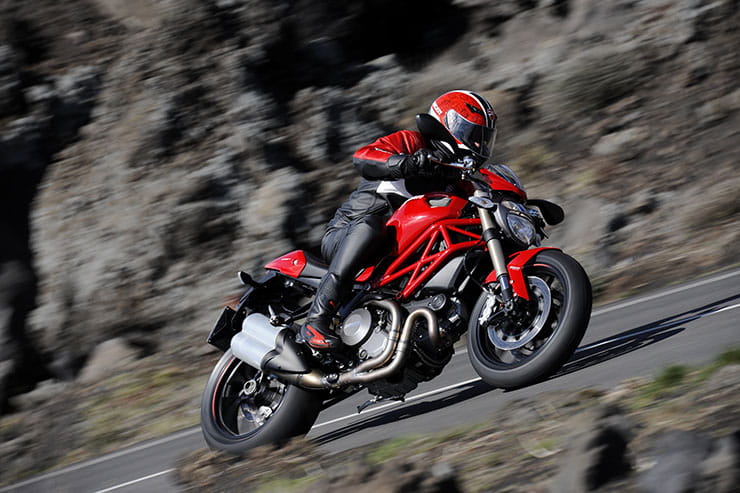
Ducati Monster 1100 Evo (2012-2013) Handling & Suspension
In moving the Evo’s exhaust system from the older 1100’s underseat position to a side-mounted one, Ducati improved the Monster’s handling slightly as they shifted a stack of weight from high up on the bike to lower down. The fact that the 1100 runs Showa forks where the Evo has Marzocchi items makes little difference to its handling, they are both fully-adjustable. There are very slight differences to the geometry of the Evo when compared to the 1100 but again, you will be hard pushed to sport and enhancement to the ride quality or agility when on the open road. So how does it handle? Very well.
Weighing just 188kg wet, the Monster is light, agile and really good fun in the bends. It isn’t a super naked but it is certainly a bike that as well as looking good is more than happy to party on a B-road. It is a bit of a shame that there was no Öhlins-shod Evo S model but on a machine like a Monster, Öhlins suspension is more to do with bling than performance and if you want to improve your Monster’s handling, get the forks re-valved by a professional and invest in a quality aftermarket shock. Which you may well have to do anyway as the Sachs unit (which is the same as the 1100’s) isn’t the best and is known to give up the ghost by about 20,000 miles. When it comes to buying used, aside from the usual swingarm issues around the eccentric adjuster in the hub, there is little to fear on a Monster – mainly as there isn’t much to go wrong! The ABS system (sensor’s aside) is strong and the Brembo brakes tend to be very robust so all should be well. Always give the wheels a good inspection, they are lightweight aluminium alloy and can ding quite easily if the tyre changer isn’t careful or the previous owner has hit a kerb a touch hard.
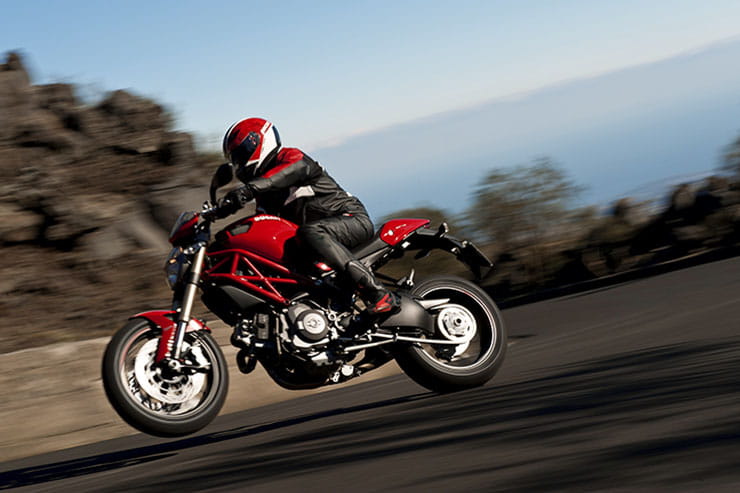
Comfort & Economy
The Monster isn’t the most comfortable bike out there and is very lacking in wind protection, making distance work a chore. A lot of owners fit a small flyscreen, which looks ok, but that’s about all you can do.
Thankfully the air-cooled engine is quite fuel-efficient with owners reporting 45mpg area figures quite common – which helps off-set its high service costs!
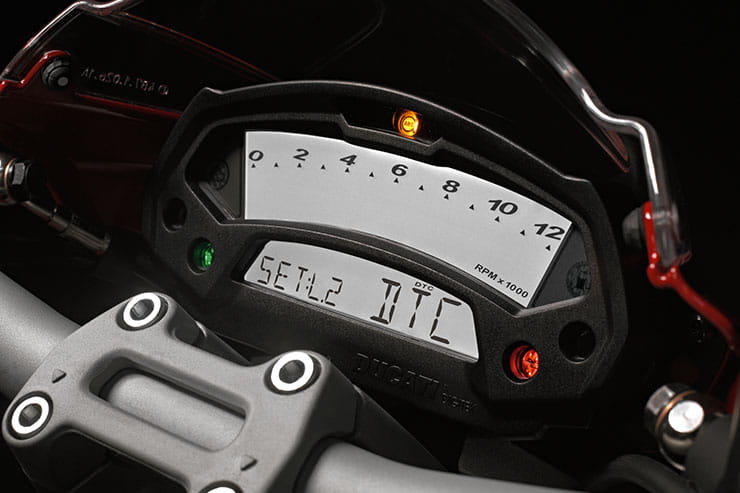
Ducati Monster 1100 Evo (2012-2013) Equipment
As well as four-stage traction control, the Monster Evo gets ABS as standard (which the 1100 also had). In 2012 Ducati were trying to punt a lot of ‘Logomania’ kits, which were basically kits to turn your Monster into a replica of an older Ducati model through tank panels and stickers. They weren’t popular and you seldom see a Logomania Monster for sale – which is probably a good thing.
When it comes to accessories, owners basically add a loud exhaust (Termi is the preferred option in twin stacked form), a tail tidy and maybe bar-end mirrors. That’s about as far as they go aside from a few bits of bolt-on bling such as billet accessories here and there. If you want to stand out, you can always buy the limited edition Diesel Monster – the matte green is kind of cool and so are its yellow calipers, black frame and extra neat styling details here and there.
Owners of the Monster 1100 Evo are generally those who are either upgrading from a smaller capacity Monster or looking at changing from a Ducati sportsbike to a naked bike. It isn’t that often that Monster owners haven’t owned a Ducati before.
Aprilia Tuono V4 (2012-2013) | Approx Price: £6000-£7000
Power/Torque: 167bhp/82lb-ft | Weight: 184kg
BMW R nineT Pure (2017-current) | Approx Price: £6999-£15,500
Power/Torque: 110bhp/87lb-ft | Weight: 219kg
BMW R nineT Roadster (2014-current) | Approx Price: £6800-£16.000
Power/Torque: 110bhp/86lb-ft | Weight: 222kg
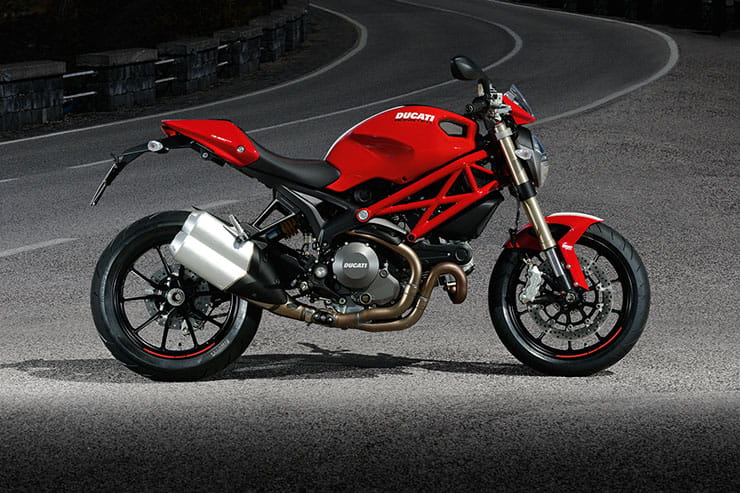
Ducati Monster 1100 Evo (2012-2013) Verdict
If you are considering buying an old-school Monster, the 1100 Evo is the bike to get. The V-twin motor is an absolute beauty with bags of performance and lots of spirit and its chassis is also excellent. Although undeniably lacking a bit of kerb appeal due to the fact there isn’t an S model, the Monster 1100 Evo is arguably the best air-cooled Monster the firm has ever built, is very reliable due to its basic nature and its side-mounted pipe is less ugly than its predecessor’s clunky underseat items.
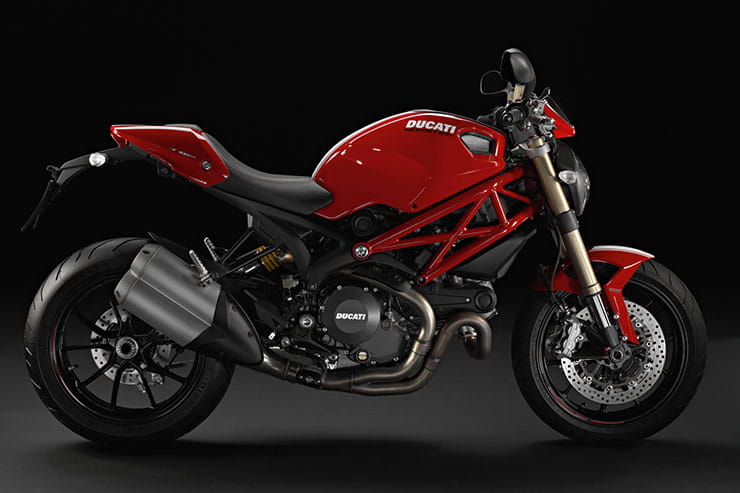
Ducati Monster 1100 Evo (2012-2013) – Technical Specification
|
Original price
|
£9426
|
|
Current price range
|
£6000-£7500
|
|
Capacity
|
1078cc
|
|
Bore x Stroke
|
98mm x 71.5mm
|
|
Engine layout
|
V-twin
|
|
Engine details
|
4v, SOHC, air-cooled desmo
|
|
Power
|
100bhp (73.5kW) @ 7500rpm
|
|
Torque
|
76lb-ft (103Nm) @ 6000rpm
|
|
Top speed
|
135mph
|
|
Transmission
|
6-speed, chain final drive
|
|
Average fuel consumption
|
45mpg
|
|
Tank size
|
13.5 litres
|
|
Max range to empty (theoretical)
|
145 Miles
|
|
Reserve capacity
|
30 miles
|
|
Rider aids
|
DTC, ABS
|
|
Frame
|
Steel trellis
|
|
Front suspension
|
43mm Marzocchi forks
|
|
Front suspension adjustment
|
Fully-adjustable
|
|
Rear suspension
|
Sachs shock
|
|
Rear suspension adjustment
|
Preload and rebound adjustable
|
|
Front brake
|
2 x 320mm discs, four-piston radial calipers. ABS
|
|
Rear brake
|
245mm disc, two-piston caliper. ABS
|
|
Front tyre
|
120/70 – ZR17
|
|
Rear tyre
|
180/55 – ZR17
|
|
Rake/Trail
|
64°/ 87mm
|
|
Dimensions (LxWxH)
|
2095mm x n/a x 1099mm
|
|
Wheelbase
|
1450mm
|
|
Ground clearance
|
n/a
|
|
Seat height
|
810mm
|
|
Kerb weight
|
188Kg Wet
|
Looking for motorcycle insurance? Get a quote for this motorbike with Bennetts bike insurance




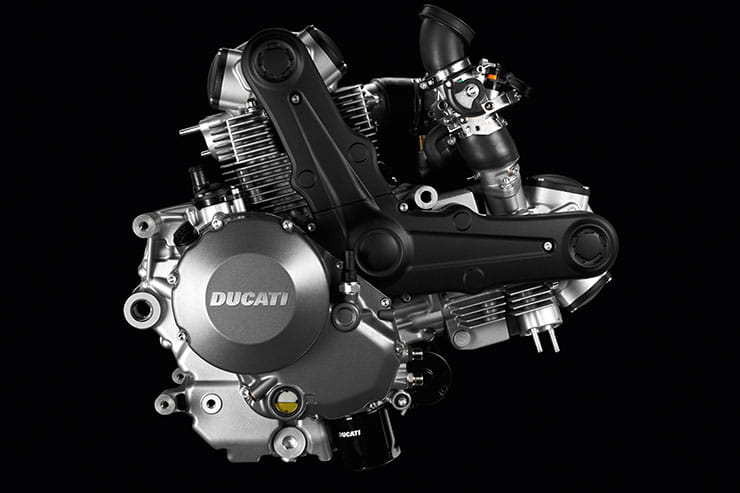
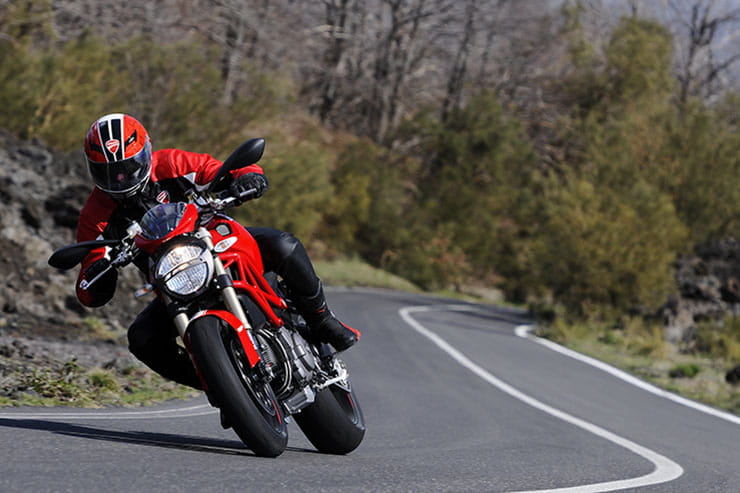



.ashx?h=493&la=en&w=740&hash=41A1D69013A830888908C8D5C7D0A8F969643EBA)
